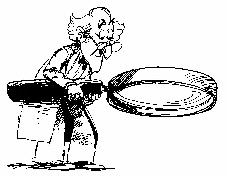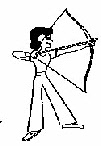

Make a point of visiting us weekly!

Return to Becoming a Learner CONTENTS PAGE
Page 8: Starting Out
Now this page is going to be remarkably simple, so simple in fact you may turn up your nose at it and wonder why we’ve wasted the space writing it. The answer is that the obvious things are often very helpful in the overall learning process and because we disdain them, learning is not as enjoyable or successful as it can be.
This page is also really a transition from Part 1 which was all about achieving a right attitude about yourself and about your ability to learn, and Part 2 which considers specific aspects or topics pertaining to this adventure called learning. On this transition page our aim is to bring some focus through one of the quotes we considered on a previous page.
Part 2: The Adventure of Learning

Bringing Focus
In the middle of a previous quotation, you may remember the following, though not in this form:
Deliberate practice has three key components:
In the middle of a previous quotation, you may remember the following, though not in this form:
Deliberate practice has three key components:
- setting specific goals;
- obtaining immediate feedback; and
- concentrating as much on technique as on outcome.
-
-
Now before we move on it is worth looking at these three elements in a fairly general way. All of these three things will help your learning experience. Indeed we would go as far as to say that a number of people drop out of courses because they have not done the things being advocated here and have not, therefore, built strength into their resolve to succeed. Each of these things will do just that – build resolve, commitment and confidence. So here are the three things:
1. Setting Specific Goals
Can I suggest something slightly different from what is usually meant when this is said? Usually we refer to the end product, but as this is all about learning, the goals that we refer to are about the learning process.
I would suggest that before you start out you need to have goals of understanding as follows:
Can I suggest something slightly different from what is usually meant when this is said? Usually we refer to the end product, but as this is all about learning, the goals that we refer to are about the learning process.
I would suggest that before you start out you need to have goals of understanding as follows:

First Goal: Ensure you understand the nature of what it is you are embarking on.
- If it something short and simple, then no problem, but if you are setting out on a proper course that is going to take, weeks, months or even years, then getting an overview of the whole course is very helpful.
- Please note that: if you are embarking on a short, self-learning exercise, you do not need to consider these things, but if it is a more structured, formal course, then a consideration of these things will definitely help.
A Course Overview? Yes, getting a sense of the overall picture of the course is helpful because it will enable you to:
- See how individual parts fit together and that helps you understand each of them more easily. Seeing how individual parts of a course fit in makes sense of each part in the overall context and, indeed, why one bit comes before another, and so on.
- Gauge the volume of the overall and that will help you more fully understand the time frame for the course, so....
Second Goal: Ensure you understand the time structure for the course.
- We will consider this as a separate subject on a later page, but it simply means recognising how much time you are going to have to allocate to this course.
2. Obtaining Immediate Feedback
This is all about you knowing how well you are doing in terms of the following:
- Content (quantity) and quality of what you do,
- Your time-keeping in terms of are you keeping to the time schedule for the course, and are you achieving work on time for handing in where necessary.
If it is a course that you have paid money for, then you are likely to have a tutor and your feedback should comprise of:
- What your tutor conveys to you along the way, and
- Your own honest assessment (conscious reflection) along the way.

The purpose of this ongoing assessment is very clear: to spot difficulties as they arise and to take action to remedy them before termination of the course becomes the only option. So often pupils at school and students at College have a negative attitude to ongoing assessment and particularly tutors drawing attention to lack of quantity of work or quality of work, as if the tutor’s objective is to fail them.
Every student needs to bear in mind that most tutors have been around a lot longer than them and:
Every student needs to bear in mind that most tutors have been around a lot longer than them and:
- prefer success in their students because it makes them look good, so they are not looking for failure, and
- know the signs of lack of commitment or lack of understanding and half-heartedness (for whatever reason and life’s problems can cause these things), and
- know the things that are needed to achieve success.
There is sometimes an arrogance in youth, linked with a sense of being invulnerable, that results in destructive tendencies in the learning process. Humility is a required characteristic of a learner! Ongoing assessment is to enable course correction to be applied if necessary – with the end goal of getting you to succeed!
3. Concentrating on Technique
Remember, the quotation was saying that technique was as important as the end outcome. In other words, the process of learning is just as important as getting the good end result – or at least it is in your conscious thinking about the course.
Yes, the end result is what you are aiming for, but how you go about it will determine whether the coming weeks or months will be enjoyable or just a hard slog. Paying attention to technique, is the key to making it enjoyable and less of a hard slog. We will look at this in different ways in the coming pages, and so here we reserve the space simply to put in a plea to think about these things and decide to make it a good experience.
Yes, the end result is what you are aiming for, but how you go about it will determine whether the coming weeks or months will be enjoyable or just a hard slog. Paying attention to technique, is the key to making it enjoyable and less of a hard slog. We will look at this in different ways in the coming pages, and so here we reserve the space simply to put in a plea to think about these things and decide to make it a good experience.

The Psychological Barrier
That which is new often appears difficult. I’ve cited examples of this and of overcoming it in earlier pages. But the truth is that when we are faced with the new, if we haven’t worked to achieve a right frame of mind, we will see what is ahead of us as a massive mountain. I can remember cramming for what seemed an impossible amount of knowledge but five years later, looking back on those examination papers, I marvelled at how simple they were and actually how little information they tested. As the years went by, with more and more knowledge being accumulated with practical experience, what had previously been seen as a mountain now appeared as a minor mole-hill.
The keys to challenging ‘the mountain? Try these by way of summary and conclusion:
That which is new often appears difficult. I’ve cited examples of this and of overcoming it in earlier pages. But the truth is that when we are faced with the new, if we haven’t worked to achieve a right frame of mind, we will see what is ahead of us as a massive mountain. I can remember cramming for what seemed an impossible amount of knowledge but five years later, looking back on those examination papers, I marvelled at how simple they were and actually how little information they tested. As the years went by, with more and more knowledge being accumulated with practical experience, what had previously been seen as a mountain now appeared as a minor mole-
The keys to challenging ‘the mountain? Try these by way of summary and conclusion:
1. Always keep an overview before you – like having the contents page of a book continually open.
2. Keep looking back at what you have covered so far, and see it all in context, seeing how the big picture is building.
3. Keep trying to get assessment of how you are doing, if from no one else, from yourself.
4. Keep a careful watch on timing – where you are in the overall scheme of things, and getting work done by required deadlines.
5. Think about the techniques of learning to make it more enjoyable.
So there it is – THINK about your course. Don’t just do it, regularly view it from outside! It does help!